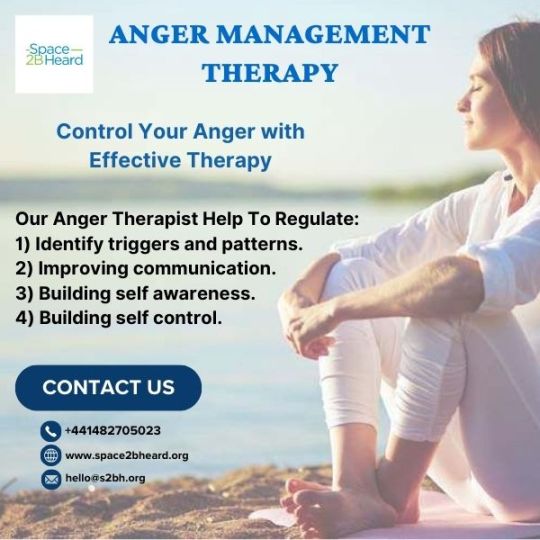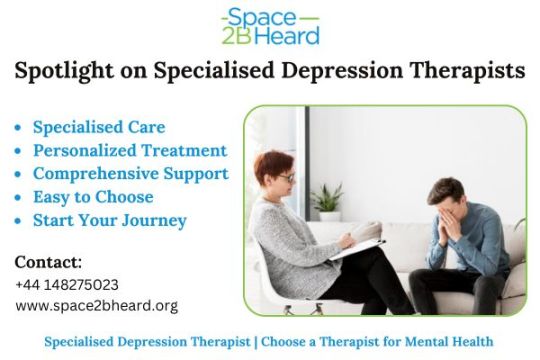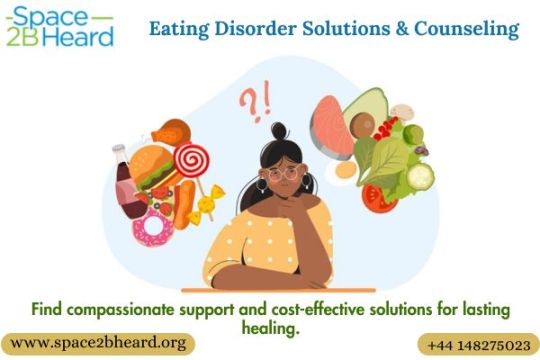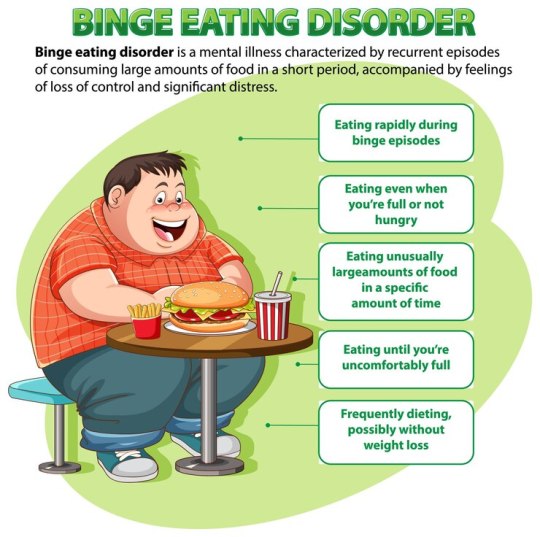Don't wanna be here? Send us removal request.
Text
Right Psychological Therapist for Mental Wellness
Space2BHeard can help you find the right psychological therapist for your mental wellness journey. Our platform connects you with experienced and compassionate therapists who are dedicated to providing expert support and guidance. Whether you're dealing with stress, anxiety, or other mental health concerns, start your path to improved mental health and well-being with the trusted professionals.
0 notes
Text
Role of an Emotional Support Therapist in Helping Teenagers Navigate Life's Challenges

Adolescence is a critical stage in human development, marked by rapid physical, emotional, and psychological changes. Teenagers often face a myriad of challenges, including academic pressure, social dynamics, family expectations, and the struggle to form their identity. These challenges can be overwhelming, leading to stress, anxiety, and other mental health issues. In such situations, the role of an emotional support therapist becomes invaluable in helping teenagers navigate these complex and turbulent times.
Understanding the Teenage Experience
Teenagers are in a constant state of transition, moving from childhood dependence to adult independence. This period is characterised by the search for identity, self-discovery, and the development of personal values. The pressures of school, friendships, family, and societal expectations can create a perfect storm of emotional turmoil. Many teens also grapple with issues like bullying, peer pressure, body image concerns, and the challenges of social media.
The Role of an Emotional Support Therapist
An emotional support therapist plays a crucial role in helping teenagers navigate these challenges. They provide a safe, non-judgemental space where teens can express their thoughts and feelings openly. This therapeutic relationship is built on trust, empathy, and understanding, allowing the therapist to guide the teenager through their emotional landscape.
1. Providing a Safe Space for Expression
Teenagers often find it difficult to talk to their parents or peers about their struggles, fearing judgement or misunderstanding. An mental health counsellor offers a confidential environment where they can express their thoughts and feelings without fear of repercussions. This open communication is the first step in addressing the emotional challenges that teenagers face.
2. Identifying and Addressing Mental Health Issues
One of the primary roles of an emotional support therapist is to identify any underlying mental health issues that may be affecting the teenager. Through careful assessment and observation, therapists can detect signs of anxiety, depression, or other disorders. Early intervention is key in preventing these issues from worsening and affecting the teen’s overall well-being.
3. Building Coping Skills
Teenagers often lack the coping skills needed to manage stress, anxiety, and other emotional challenges. A mental health counsellor helps teens develop these skills, teaching them healthy ways to cope with difficult emotions and situations. This might include techniques such as mindfulness, cognitive-behavioural strategies, and problem-solving skills. By equipping teenagers with these tools, therapists empower them to handle life’s challenges more effectively.
Preventing Long-Term Issues
Choosing the right therapist for teenagers can have long-term benefits. By addressing emotional and mental health issues early, therapists help prevent these challenges from escalating into more severe problems in adulthood. The skills and insights gained through therapy can have a lasting impact, equipping teenagers with the resilience and emotional intelligence needed to navigate life’s future challenges.
Conclusion
The role of a mental health therapist in a teenager’s life cannot be overstated. They provide essential guidance, support, and tools that help teenagers navigate the complexities of adolescence. By offering a safe space for expression, identifying and addressing mental health issues, and helping teens build coping skills, therapists play a vital role in ensuring that young people can face life’s challenges with confidence and resilience. For parents and guardians, seeking the help of a mental health professional like Space2BHeard can be one of the most important steps in supporting their teenager’s mental and emotional well-being.
0 notes
Text
Control Anger with Effective Anger Management Therapy

At Space2Bheard, we provide effective anger management therapy, which can help you gain control over anger issues. Our therapist has expertise in cognitive-behavioural therapy (CBT), mindfulness-based therapy, and psychodynamic therapy. To know more, visit our website.
0 notes
Text
Supportive Family Therapy in Hull by Space2Bheard
Get supportive family therapy in Hull with Space2Bheard. Here we provide the best therapy solution for mental and physical health and wellbeing with easy support. Get to know more by visiting our website.
0 notes
Text
Emotional Support Therapist in Hull | Compassionate Care at Space2BHeard
Explore skilled emotional support therapist services in Hull at Space2BHeard. Find personalized care and guidance to improve your well-being.
0 notes
Text

Spotlight on Specialised Depression Therapists
Explore our dedicated depression therapist at Space2bHeard. Our specialised therapists provide personalised mental health support in Hull, tailored to help you navigate and overcome depression. Discover the right therapist for your needs by visiting a specialised depression therapist and choosing a therapist for mental health. Start your journey towards better mental health today.
0 notes
Text
Understanding the Power of Social Anxiety Group Therapy

Social anxiety can be a daunting challenge, affecting countless individuals worldwide. Fortunately, social anxiety group therapy has emerged as a beacon of hope, providing a supportive and structured environment for those struggling with this condition. Group therapy offers a unique setting where participants can share their experiences, learn from one another, and develop strategies to manage their anxiety in social situations. But how does it actually function, and what advantages does it offer? How Group Therapy Can Help Overcome Social Anxiety Shared Experiences: One of the core benefits of group therapy is the opportunity to connect with others who understand your struggles. Sharing experiences with peers who face similar challenges can be incredibly validating and reassuring. It helps break down the isolation that often accompanies social anxiety, fostering a sense of belonging and community. Support and Encouragement: In a group setting, participants can offer and receive support and encouragement. This collective dynamic can significantly boost motivation and commitment to overcoming anxiety. Knowing that others are rooting for your success can make a substantial difference in your therapeutic journey. Learning New Skills: Group therapy often incorporates various therapeutic techniques, such as cognitive-behavioural therapy (CBT), which are tailored to address social anxiety. These sessions provide a platform for practicing new skills in a safe and controlled environment, which can then be applied to real-world situations. A Safe Space for TeenagersTeenagers, in particular, can benefit immensely from group therapy. The adolescent years are a critical period for social development, and social anxiety can severely hinder this process. A therapist for teenagers can guide young individuals through their anxiety, helping them build confidence and social skills. In a group setting, teenagers can see that they are not alone in their struggles and can learn from the experiences of their peers. This peer support can be particularly powerful during such a formative stage of life. Practical Steps to Overcoming Social Anxiety In addition to attending therapy sessions, there are several practical steps individuals can take to manage social anxiety: Mindfulness and Relaxation Techniques: Practices such as mindfulness meditation and deep breathing exercises can help reduce anxiety levels and improve focus. Gradual Exposure: Gradually exposing oneself to social situations, starting with less intimidating scenarios and progressively tackling more challenging ones, can help desensitise anxiety responses. Self-Compassion: Practising self-compassion and challenging negative self-talk can improve self-esteem and reduce anxiety. Conclusion In conclusion, social anxiety group therapy provides a supportive and effective way to address social anxiety. By participating in group therapy sessions, individuals can gain valuable insights, learn new coping strategies, and build meaningful connections with others who understand their struggles. For teenagers, having access to a specialised therapist can make a significant difference in their ability to navigate social challenges. At Space2BHeard, we are committed to providing a safe and nurturing environment where individuals can overcome social anxiety and lead fulfilling lives. Join us today and take the first step towards a brighter, more confident future. Our dedicated team at Space2BHeard is here to support you every step of the way.
0 notes
Text
Effective Psychotherapist in Hull - Space2BHeard Discover expert psychotherapy services in Hull at Space2BHeard. Our skilled therapists offer compassionate support tailored to your needs. Visit us for valued minds and effective anger management therapy.
#TherapistHull#Psychotherapy#CounselingServices#HullTherapist#HullPsychotherapy#MentalHealthSupport#TherapyServices
0 notes
Text
Explore effective strategies for managing social anxiety through supportive group therapy sessions at Space2BHeard. Discover the importance of choosing the right therapist for teenagers who specialise in addressing their unique needs. Magda Laskowska offers compassionate therapy tailored to adolescents, fostering growth and resilience.
0 notes
Text
What are psychological therapies and therapeutic counselling?

In the realm of mental health and well-being, psychological therapies and therapeutic counselling play pivotal roles in aiding individuals in overcoming various challenges, managing emotions, and fostering personal growth. These approaches encompass a diverse range of techniques and strategies aimed at addressing psychological issues and improving overall quality of life. In this comprehensive guide, we delve into the essence of psychological therapies and therapeutic counselling, exploring their principles, methods, and benefits.
What are Psychological Therapies?
Psychological therapies, also known as psychotherapy, talk therapy, or mental health group therapy sessions, encompass a broad spectrum of treatments aimed at addressing emotional distress, mental health disorders, behavioural issues, and interpersonal conflicts. These therapies are grounded in psychological principles and are conducted by trained professionals such as psychologists, counsellors, or therapists.
Principles of Psychological Therapies:
Collaborative Approach: Psychological therapies emphasise collaboration between the therapist and the client. The psychological therapist provides a safe and supportive environment for clients to Discover their thoughts, feelings, and experiences.
Insight and Awareness: Therapies often aim to increase self-awareness and insight into one's thoughts, emotions, and behaviours. This awareness is crucial for initiating change and fostering personal growth.
Evidence-Based Practices: Many psychological therapies are supported by empirical research and evidence-based practices, ensuring their effectiveness in treating various mental health issues.
Holistic Perspective: Therapies consider the individual as a whole, taking into account their psychological, emotional, social, and cultural dimensions. This holistic approach facilitates comprehensive treatment and understanding of the client's needs.
Types of Psychological Therapies:
Cognitive-Behavioural Therapy (CBT): CBT focuses on identifying and challenging negative thought patterns and behaviours. It aims to modify dysfunctional beliefs and develop coping strategies to manage stress, anxiety, depression, and other mental health conditions.
Psychodynamic Therapy: Rooted in psychoanalytic principles, psychodynamic therapy explores unconscious conflicts and past experiences that influence present behaviour and emotions. It aims to bring hidden dynamics into conscious awareness to promote healing and personal development.
Humanistic Therapies: Humanistic approaches such as person-centred therapy and Gestalt therapy emphasises self-exploration, self-acceptance, and personal growth. These therapies prioritise the client's subjective experience and their capacity for self-direction and fulfilment.
Mindfulness-Based Therapies: Mindfulness-based therapies, including mindfulness-based stress reduction (MBSR) and mindfulness group therapy (MBCT), incorporate mindfulness practices to cultivate present-moment awareness and alleviate psychological distress.
Family Therapy: Family therapy focuses on addressing relational dynamics and conflicts within families or couples. It aims to improve communication, resolve conflicts, and strengthen familial bonds.
What is Therapeutic Counselling?
Therapeutic counselling, often used interchangeably with counselling or counselling therapy, refers to a collaborative process between a trained counsellor or therapist and an individual seeking support. Counselling aims to help individuals discover their feelings, beliefs, and behaviours and develop strategies to cope with challenges and improve their well-being.
Principles:
Empathy and Understanding: Counsellors provide empathy, acceptance, and non-judgmental support to clients, creating a safe space for them to express themselves openly.
Client-Centred Approach: Therapeutic counselling adopts a client-centred approach where the client's needs, goals, and experiences are central to the therapeutic process. Counsellors work collaboratively with clients to address their concerns and facilitate personal growth.
Goal-Oriented Intervention: Counselling sessions often focus on specific goals or areas of concern identified by the client. Counsellors help clients set realistic and achievable goals and work towards their attainment through structured interventions.
Confidentiality and Trust: Maintaining confidentiality and building trust are fundamental principles of therapeutic counselling. Clients should feel assured that their privacy is respected and that they can freely disclose sensitive information without fear of judgement or breach of confidentiality.
Types of Therapeutic Counselling:
Individual Counselling: Individual counselling involves one-on-one sessions between a counsellor and a client. It provides a personalised space for clients to examine their thoughts, emotions, and concerns in depth.
Group Counselling: Group counselling brings together individuals facing similar challenges or issues to share experiences, offer support, and learn from one another under the guidance of a trained counsellor.
Marriage or Couples Counselling: Marriage or couples counselling focuses on improving communication, resolving conflicts, and strengthening relationships between partners.
Career Counselling: Career counselling helps individuals navigate career options, assess their skills and interests, and make informed decisions about their professional development.
Benefits of Psychological Therapies and Therapeutic Counselling:
Improved Emotional Well-being: Psychological therapies and counselling can help individuals manage stress, anxiety, depression, and other emotional challenges effectively.
Enhanced Self-Awareness: These approaches facilitate self-exploration and insight, leading to greater self-awareness and personal growth.
Better Coping Strategies: Clients learn adaptive coping strategies and problem-solving skills to navigate life's challenges more effectively.
Enhanced Relationships: Counselling can improve communication, conflict resolution, and interpersonal skills, fostering healthy relationships with oneself and others.
Empowerment and Resilience: Through therapy, individuals develop a sense of empowerment, resilience, and self-efficacy, enabling them to overcome obstacles and thrive in various aspects of life.
In conclusion, psychological therapies and therapeutic counselling, such as those offered by Space2BHeard, serve as invaluable tools for promoting mental health group therapy, facilitating personal growth, and enhancing overall well-being. Whether addressing specific mental health issues, navigating life transitions, or seeking personal development, individuals can benefit significantly from the collaborative support and guidance provided by trained professionals in these fields. By embracing these approaches, individuals can embark on a journey of self-discovery, healing, and empowerment, ultimately leading to a more fulfilling and meaningful life.
0 notes
Text
Explore independent counselling services in Hull with Space2BHeard. Find the support you need for mental health challenges.
0 notes
Text
Compassionate Eating Disorder Solutions & Counselling

Seeking effective eating disorder solutions? Look no further. Our comprehensive eating disorder counselling services offer personalised support and guidance to help you navigate this challenging journey. Whether you're struggling with anorexia, bulimia, or binge eating, our experienced counselors provide compassionate care tailored to your individual needs. Take the first step towards recovery and reclaim control over your health and well-being with our specialised eating disorder counselling.
0 notes
Text
Find compassionate support and tailored psychotherapists in Hull. Our experienced psychotherapist offers personalised sessions to help you navigate life's challenges and achieve emotional well-being.
0 notes
Text
The Mind-Body Connection: How Eating Disorders Impact Mental Health

The intricate relationship between the mind and body has long fascinated scholars, researchers, and medical professionals. In recent years, this connection has gained significant attention, particularly concerning mental health, with a focus on eating disorders. Disorders like anorexia nervosa, bulimia nervosa, and binge-eating disorder not only exhibit physical symptoms but also deeply affect mental and emotional well-being, an issue of concern given the prevalence of eating disorders in Hull.
Understanding the Complexity of Eating Disorders
Eating disorders are intricate mental illnesses characterised by abnormal eating habits and distress about body weight or shape. While they often involve behaviours related to food and weight control, their origins delve much deeper into psychological and emotional realms. These disorders can stem from various factors, including genetic predispositions, societal pressures, traumatic experiences, and psychological vulnerabilities.
Impact on Mental Health
The mental health implications of eating disorders are profound and multifaceted. Individuals grappling with these disorders commonly experience a spectrum of psychological symptoms, including anxiety, depression, obsessive-compulsive tendencies, and distorted self-perceptions. The incessant preoccupation with food, weight, and body image can engulf their thoughts, leading to feelings of worthlessness, guilt, and inadequacy.
Moreover, the secretive nature of some eating disorder behaviours, such as binge eating or purging, can breed intense feelings of shame and isolation. This internalised stigma often exacerbates existing mental health challenges, fueling a detrimental cycle of negative thoughts and behaviours.
Body Dysmorphia and Distorted Self-Perception
Distorted self-perception and body dysmorphia are common features alongside eating disorders, exacerbating the psychological burden on affected individuals. Body dysmorphic disorder (BDD) encompasses obsessive thoughts about perceived flaws in appearance, which may be exaggerated or entirely imagined. Consequently, individuals with eating disorders frequently engage in disordered eating behaviours, driven by these distorted perceptions as they chase an unattainable standard of physical perfection.
The Consequences of Malnutrition and Mental Health
In addition to the psychological effects, eating disorders can lead to severe physical health complications, primarily due to malnutrition. Prolonged inadequate nutrition can result in various medical issues, including cardiovascular problems, bone density loss, gastrointestinal disturbances, and hormonal imbalances, significantly impacting mental health in Hull. These physical ailments further compound the mental health challenges faced by individuals with eating disorders, perpetuating a cycle of deteriorating well-being.
The Role of Treatment in Hull
Addressing eating disorders requires a comprehensive approach that integrates both physical and psychological interventions. Medical stabilisation and nutritional rehabilitation are crucial components of addressing the immediate health risks associated with disordered eating behaviours.
Effective treatment must also target the underlying psychological factors driving the disorder. Psychotherapy, particularly cognitive-behavioural therapy (CBT), is widely recognised as a cornerstone of eating disorder treatment. CBT assists individuals in challenging distorted thoughts and beliefs about food, weight, and body image, fostering healthier coping mechanisms and self-perceptions.
Moreover, holistic approaches incorporating mindfulness practices, nutritional education, and support groups offer individuals the tools needed for sustained long-term recovery. Family involvement and social support networks also play integral roles in the healing process, providing encouragement, understanding, and accountability.
Conclusion
The mind-body connection inherent in eating disorders highlights the necessity for a comprehensive treatment approach addressing both physical and psychological aspects. Recognising and addressing the interplay between mental health and disordered eating behaviours is essential for individuals to embark on a journey towards recovery, encompassing holistic healing and improved overall well-being. Through increased awareness, education, and support, including counselling in Hull, organisations like Space2BHeard can foster a more compassionate and inclusive understanding of eating disorders. This approach paves the way for enhanced treatment outcomes and improved quality of life for those affected in Hull.
Reference:
https://www.bizbangboom.com/hull-east-yorkshire/professional-services/space2bheard
https://telegra.ph/The-Vital-Role-of-a-Depression-Therapist-in-Your-Recovery-01-25
0 notes
Text
Sign Up for Counselling in Hull at Space2BHeard
Seeking compassionate counselling in Hull? Look no further than Space2BHeard. Our dedicated team offers a safe and supportive environment where you can explore your thoughts and emotions. Whether you're facing challenges or seeking personal growth, our experienced therapists are here to listen and guide you on your journey towards healing and self-discovery. Take the first step towards positive change with us today.
0 notes
Text

Consult with a Specialist at Space2BHeard for Eating Disorders in Hull
Discover support and understanding for eating disorders in Hull with Space2BHeard. Our compassionate team is dedicated to providing a safe space where individuals can share their struggles and find solace. Embrace healing and empowerment through our inclusive community, fostering resilience and recovery. You can opt for our services anywhere in Hull, United Kingdom.
0 notes
Text
Consult with an Experienced Psychotherapist at Space2BHeard
At Space2BHeard, our psychotherapists create a safe and empathetic environment, inviting you to share and be truly heard. We offer a sanctuary for self-exploration and growth, where our experienced professionals provide compassionate guidance on your journey towards mental well-being. You can opt for our services anywhere in Hull, UK.
0 notes